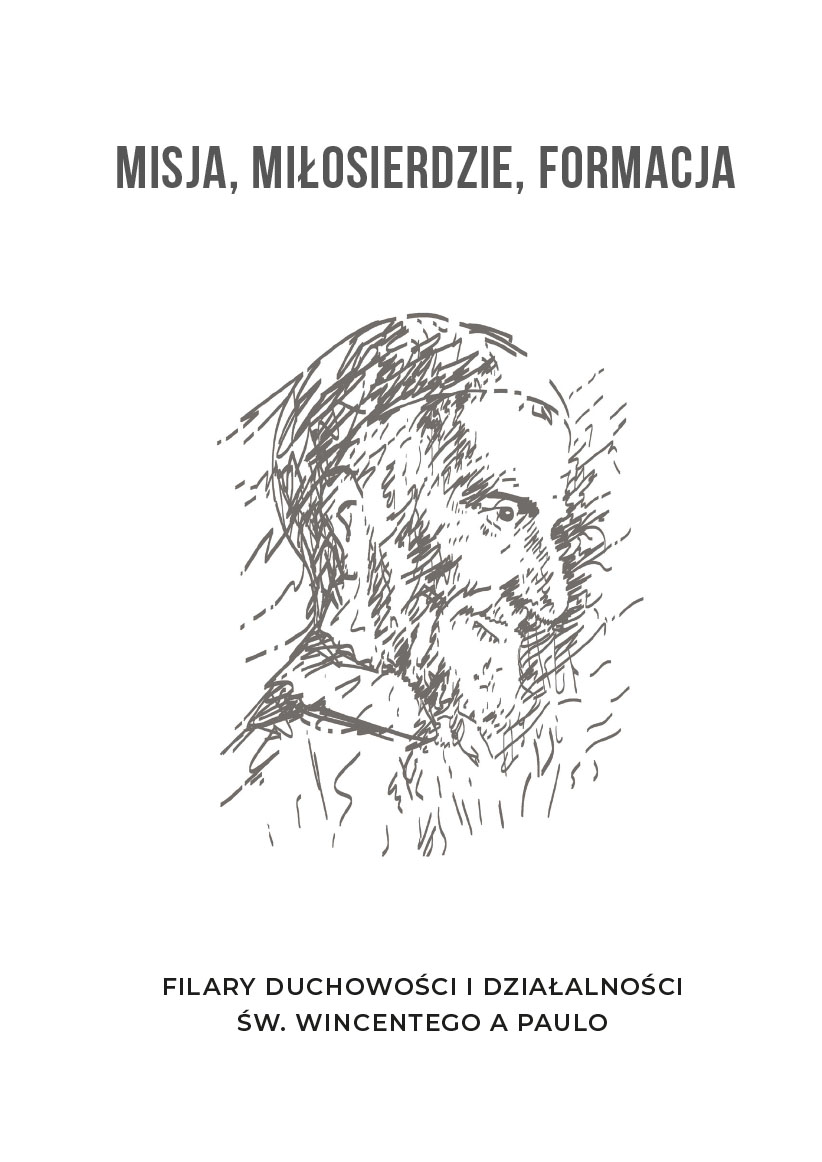Misja, miłosierdzie, formacja – filary duchowości i działalności św. Wincentego a Paulo

Oglądaj/
Data
2024Autor
Lipiński, Michał
Sejbuk, Adam
Szpoton, Szczepan
Metadata
Pokaż pełny rekordStreszczenie
Monografia „Misja, miłosierdzie, formacja – filary duchowości i działalności św. Wincentego a Paulo” szczegółowo analizuje trzy kluczowe elementy charyzmatu wincentyńskiego: misję, miłosierdzie oraz formację duchowieństwa, ukazując ich historyczne, teologiczne i współczesne znaczenie. Pierwszy rozdział autorstwa Michała Lipińskiego CM przedstawia duchowe tło powstania Zgromadzenia Księży Misjonarzy w XVII-wiecznej Francji, podkreślając wpływy różnych nurtów duchowości, takich jak mistycyzm nadreńsko-flamandzki, devotio moderna oraz szkoła francuska. Rozdział poświęcony misji autorstwa Corpus Delgado CM i Jakuba Kasprzyka CM wskazuje na ewolucję i aktualność misji wincentyńskich w kontekście współczesnego Kościoła, szczególnie w świetle nauczania papieża Franciszka i dokumentu Evangelii gaudium. Giuseppe Guerra CM omawia miłosierdzie jako centralny element duchowości św. Wincentego, ilustrując je przykładami z jego życia, natomiast siostra Stanisława Krasucka SM opisuje jego praktyczne aspekty, takie jak mistyka służby czy organizowanie pomocy dla ubogich. Kolejne rozdziały, poświęcone formacji, ukazują wkład św. Wincentego w kształtowanie duchowieństwa poprzez rekolekcje, konferencje wtorkowe i prowadzenie seminariów duchownych, które wywarły znaczący wpływ na model kształcenia duchownych w XVII wieku. Szczepan Szpoton CM szczegółowo omawia duchowe fundamenty kapłaństwa w nauczaniu św. Wincentego, a Adam Sejbuk CM analizuje wpływ Soboru Trydenckiego na formację seminaryjną, podkreślając nowatorskie podejście Zgromadzenia Misji do przygotowania pastoralnego. Monografia łączy analizę historyczną z refleksją teologiczną, inspirując do odnowienia charyzmatu wincentyńskiego we współczesnym Kościele. Jest także zaproszeniem do pogłębienia duchowości oraz zaangażowania w misję Kościoła, której filarem jest miłosierdzie, a fundamentem solidna formacja duchowa. The monograph “Mission, Mercy, Formation – Pillars of the Spirituality and Activity of St. Vincent de Paul” provides an in-depth analysis of the three key elements of Vincentian charism: mission, mercy, and the formation of clergy, exploring their historical, theological, and contemporary significance. The first chapter, authored by Michał Lipiński CM, delves into the spiritual context of the founding of the Congregation of the Mission in 17th-century France, highlighting the influence of various spiritual movements such as the Rhineland-Flemish mysticism, devotio moderna, and the French school of spirituality. The chapter on mission, written by Corpus Delgado CM and Jakub Kasprzyk CM, discusses the evolution and current relevance of Vincentian missions within the modern Church, particularly in the light of Pope Francis' teachings and the document Evangelii gaudium. Giuseppe Guerra CM examines mercy as the central element of St. Vincent's spirituality, illustrated through events from his life, while Sister Stanisława Krasucka SM details its practical aspects, such as the mysticism of service and organizing assistance for the poor. Subsequent chapters focus on formation, highlighting St. Vincent's contributions to shaping clergy through retreats, Tuesday conferences, and the management of seminaries, which significantly influenced the clergy formation model in the 17th century. Szczepan Szpoton CM provides a detailed exploration of the spiritual foundations of priesthood in St. Vincent’s teachings, while Adam Sejbuk CM analyzes the impact of the Council of Trent on seminary formation, emphasizing the Congregation of the Mission's innovative approach to pastoral preparation. The monograph combines historical analysis with theological reflection, inspiring a renewal of Vincentian charism in the contemporary Church. It also serves as an invitation to deepen one’s spirituality and engagement in the Church’s mission, whose cornerstone is mercy, and whose foundation lies in solid spiritual formation.
ISBN
978-83-7643-254-0978-83-7643-255-7

